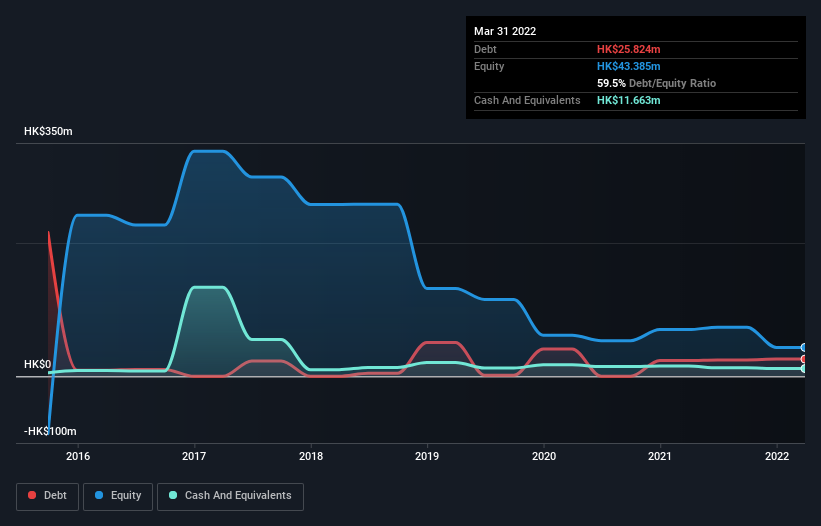
The external fund manager backed by Berkshire Hathaway's Charlie Munger, Li Lu, makes no bones about it when he says 'The biggest investment risk is not the volatility of prices, but whether you will suffer a permanent loss of capital.' When we think about how risky a company is, we always like to look at its use of debt, since debt overload can lead to ruin. We note that Elife Holdings Limited (HKG:223) does have debt on its balance sheet. But should shareholders be worried about its use of debt?
Why Does Debt Bring Risk?
Debt assists a business until the business has trouble paying it off, either with new capital or with free cash flow. In the worst case scenario, a company can go bankrupt if it cannot pay its creditors. However, a more common (but still painful) scenario is that it has to raise new equity capital at a low price, thus permanently diluting shareholders. By replacing dilution, though, debt can be an extremely good tool for businesses that need capital to invest in growth at high rates of return. When we think about a company's use of debt, we first look at cash and debt together.
See our latest analysis for Elife Holdings
How Much Debt Does Elife Holdings Carry?
You can click the graphic below for the historical numbers, but it shows that as of March 2022 Elife Holdings had HK$25.8m of debt, an increase on HK$23.7m, over one year. However, it also had HK$11.7m in cash, and so its net debt is HK$14.2m.

How Strong Is Elife Holdings' Balance Sheet?
The latest balance sheet data shows that Elife Holdings had liabilities of HK$56.3m due within a year, and liabilities of HK$1.66m falling due after that. Offsetting these obligations, it had cash of HK$11.7m as well as receivables valued at HK$48.6m due within 12 months. So it can boast HK$2.33m more liquid assets than total liabilities.
This short term liquidity is a sign that Elife Holdings could probably pay off its debt with ease, as its balance sheet is far from stretched. When analysing debt levels, the balance sheet is the obvious place to start. But you can't view debt in total isolation; since Elife Holdings will need earnings to service that debt. So if you're keen to discover more about its earnings, it might be worth checking out this graph of its long term earnings trend.
Over 12 months, Elife Holdings made a loss at the EBIT level, and saw its revenue drop to HK$153m, which is a fall of 45%. To be frank that doesn't bode well.
Caveat Emptor
Not only did Elife Holdings's revenue slip over the last twelve months, but it also produced negative earnings before interest and tax (EBIT). Its EBIT loss was a whopping HK$48m. Looking on the brighter side, the business has adequate liquid assets, which give it time to grow and develop before its debt becomes a near-term issue. But a profit would do more to inspire us to research the business more closely. So it seems too risky for our taste. There's no doubt that we learn most about debt from the balance sheet. But ultimately, every company can contain risks that exist outside of the balance sheet. These risks can be hard to spot. Every company has them, and we've spotted 3 warning signs for Elife Holdings you should know about.
If you're interested in investing in businesses that can grow profits without the burden of debt, then check out this free list of growing businesses that have net cash on the balance sheet.
If you're looking to trade Elife Holdings, open an account with the lowest-cost platform trusted by professionals, Interactive Brokers.
With clients in over 200 countries and territories, and access to 160 markets, IBKR lets you trade stocks, options, futures, forex, bonds and funds from a single integrated account.
Enjoy no hidden fees, no account minimums, and FX conversion rates as low as 0.03%, far better than what most brokers offer.
Sponsored ContentValuation is complex, but we're here to simplify it.
Discover if Elife Holdings might be undervalued or overvalued with our detailed analysis, featuring fair value estimates, potential risks, dividends, insider trades, and its financial condition.
Access Free AnalysisHave feedback on this article? Concerned about the content? Get in touch with us directly. Alternatively, email editorial-team (at) simplywallst.com.
This article by Simply Wall St is general in nature. We provide commentary based on historical data and analyst forecasts only using an unbiased methodology and our articles are not intended to be financial advice. It does not constitute a recommendation to buy or sell any stock, and does not take account of your objectives, or your financial situation. We aim to bring you long-term focused analysis driven by fundamental data. Note that our analysis may not factor in the latest price-sensitive company announcements or qualitative material. Simply Wall St has no position in any stocks mentioned.
About SEHK:223
Elife Holdings
An investment holding company, engages in the supply chain business for branded goods and consumer products in Hong Kong and the People’s Republic of China.
Adequate balance sheet slight.
Market Insights
Community Narratives



